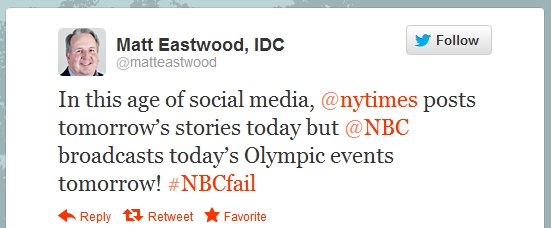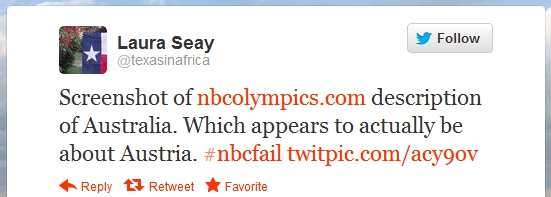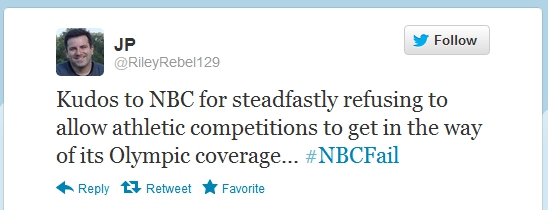Bad scheduling, a tape delay, and condescending comments. These are just some of the complaints coming from viewers of NBC’s Olympics coverage, showing how the US broadcaster has dropped the ball on the biggest sporting event of the year.
From the opening ceremony through to a weekend of sporting legends being made, NBC has botched its Olympics coverage left, right and centre, if the comments from viewers online are anything to go by.
Twitter users have taken to tagging tweets with the hashtag #NBCfail, pointing out the many ways in which the official US broadcaster of the games has let its tech-savvy viewers down.

Opening ceremony woes
First was the decision to delay coverage of the opening ceremony until prime time and not provide a live stream, meaning US viewers were hearing of the Danny Boyle-directed spectacle online more than three hours before they could see it for themselves.

Twitter users especially could not escape the ‘spoilers’, with the clueless NBC account even live-tweeting the event it wasn’t broadcasting.
NBC’s reason for broadcasting the event in this way was to allow its producers and hosts to provide context for American viewers. In a statement to the Los Angeles Times, the network said: “It was never our intent to live stream the opening ceremony or closing ceremony. They are complex entertainment spectacles that do not translate well online because they require context, which our award-winning production team will provide for the large prime-time audiences that gather together to watch them.”
NBC’s brand of cultural context
This ‘context’, however, has also fallen under criticism. NBC hosts have been ridiculed for their lack of research on the international event as viewers noted how country’s names were mispronounced and presenter Bob Costas grasped at any reference he could find for more unfamiliar nations – no matter how shallow.
Costas’ ill-advised cultural (and not-so-cultured) references included the mention of military dictator Idi Amin on seeing Uganda, and making reference to Borat on seeing Kazakhstan.

In an oversight which particularly tickled tech fans, host Meredith Vieira openly admitted to not knowing who Tim Berners-Lee was when he appeared on-screen, apparently assuming that no one in the US would, saying, “If you haven’t heard of him, we haven’t either.” The advice of her co-host Matt Lauer to Google him makes her ignorance of the inventor of the world wide web even more cringeworthy.
NBC’s lack of geographical knowledge doesn’t stop with its presenters either, as one Twitter user points out the errors made in its Olympics app.


An old-media model in a new-media world
While saving the best for prime-time broadcasting has long been a pillar of television production, for a worldwide event that is unfolding as much on social networks as it is on the television screen, this just doesn’t work. Bad enough that US viewers had to hear of what was happening during the opening ceremony long before they would get to see it, but the lack of live broadcasting continued throughout the weekend, meaning the results of major events were revealed – even by NBC – before US viewers had the chance to see them.

NBC’s old-media approach to what should be a new-media spectacle focusing on the real-time aspect has left many viewers frustrated and disappointed. Though viewers online can live-stream many events, those that prefer to view on TV have to avoid social media channels or risk finding out about results too soon.
Even as NBC broadcasted the sporting events, viewers continued to complain about the numerous interruptions in coverage of the actual sports, be they advertisements, interviews or comments from the presenters.

Among segments omitted from the US broadcast of the opening ceremony was a memorial tribute to family members of those at the opening ceremony and victims of the London bombings on 7 July 2005.
Despite the backlash, NBC has still reported its best ratings ever for the opening night of the games, but judging from the response on Twitter it seems many viewers were watching the coverage in spite of, rather than in favour of, the delayed and edited broadcast.